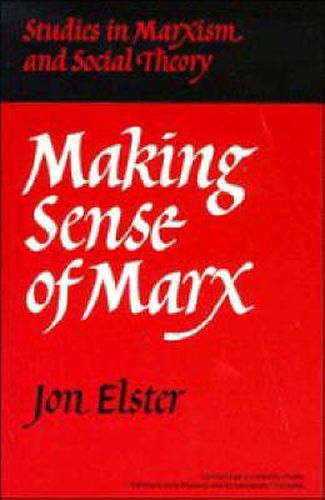Readings Newsletter
Become a Readings Member to make your shopping experience even easier.
Sign in or sign up for free!
You’re not far away from qualifying for FREE standard shipping within Australia
You’ve qualified for FREE standard shipping within Australia
The cart is loading…






A systematic, critical examination of Karl Marx’s social theories and their philosophical presuppositions. Through extensive discussions of the texts Jon Elster offers a balanced and detailed account of Marx’s views that is at once sympathetic, undogmatic and rigorous. Equally importantly he tries to assess ‘what is living and what is dead in the philosophy of Marx’, using the analytical resources of contemporary social science and philosophy. Professor Elster insists on the need for microfoundations in social science and provides a systematic criticism of functionalism and teleological thinking in Marx. He argues that Marx’s economic theories are largely wrong or irrelevant; historical materialism is seen to have only limited plausibility (and is not even consistently applied by Marx); Marx’s most lasting achievements are the criticism of capitalism in terms of alienation and exploitation and the theory of class struggle, politics and ideology under capitalism, though in these areas too Elster enters substantial qualifications. The book should take its place as the most comprehensive and sophisticated modern study available.
$9.00 standard shipping within Australia
FREE standard shipping within Australia for orders over $100.00
Express & International shipping calculated at checkout
A systematic, critical examination of Karl Marx’s social theories and their philosophical presuppositions. Through extensive discussions of the texts Jon Elster offers a balanced and detailed account of Marx’s views that is at once sympathetic, undogmatic and rigorous. Equally importantly he tries to assess ‘what is living and what is dead in the philosophy of Marx’, using the analytical resources of contemporary social science and philosophy. Professor Elster insists on the need for microfoundations in social science and provides a systematic criticism of functionalism and teleological thinking in Marx. He argues that Marx’s economic theories are largely wrong or irrelevant; historical materialism is seen to have only limited plausibility (and is not even consistently applied by Marx); Marx’s most lasting achievements are the criticism of capitalism in terms of alienation and exploitation and the theory of class struggle, politics and ideology under capitalism, though in these areas too Elster enters substantial qualifications. The book should take its place as the most comprehensive and sophisticated modern study available.